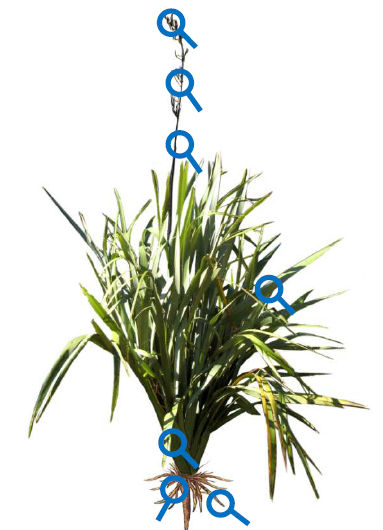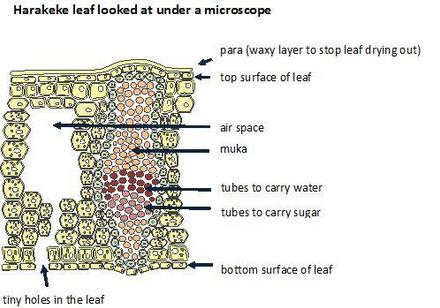Harakeke 3
Activity: How does harakeke survive? – Level 4
Achievement objectives - whāinga paetae: Te aka
4.1 Recognise that there are biological processes common to all organisms, and that those occur in different ways in different species. Te Marautanga o Aotearoa: (p. 101) te ao tūroa, te rauropi 1
4.1 Recognise that organisms are built of cells. Although cells are very small, the materials in them are involved in certain biological processes. (p. 15, pūtaiao i roto i Te Marautanga o Aotearoa)
Learning outcome
I will be able to:
- identify structures of harakeke that carry out some of the life processes
- identify cells in a harakeke leaf that carry out some of the life processes.
Success criteria
- I can identify structures of harakeke that carry out life processes.
- I can identify cells in a harakeke leaf that carry out life processes.
All living things carry out various processes in order to stay alive such as:
- taking in food or making it themselves
- converting the food to give energy
- growing
- reproducing
- getting rid of unwanted waste
- sensing their environment
- movement
Different parts of the harakeke plant carry out different jobs in order to survive. Try the following activity to see how much you already know about plants.
Match the following list of structures of the harakeke plant with their job:
| Harakeke structure | Job of the structure |
|---|---|
| Root (akaaka) | Allows air to enter the leaf, waste gasses to leave |
| Root tip | Makes food for the plant using carbon dioxide, water and sunlight |
| Leaf (whā) | Stops the leaf drying out |
| Stem (kakau) | Supports the leaf |
| Young leaves (rito) | A case that opens when seeds are ready to be released |
| Seed pod (puhui hua) | New growth comes from this point |
| Flower (puāwai) | Where sexual reproduction takes place |
| Tiny holes in the leaves | Anchors the plant and takes in water |
| Waxy surface of the leaf (para) | Has special cells that detect (sense) gravity and moisture |
| Muka | Holds the flower upright for pollination |
| Pollen inside the flowers | Sweet for the birds and bees |
| Nectar inside the flowers | A fine powder produced by certain plants when they reproduce |
You can find out more about the harakeke leaf by clicking on the magnifying glasses below.


All living things carry out various processes in order to stay alive. Have a look at your table of harakeke structures and their jobs, and use this information to name the harakeke structures in the table below:
| Life process | Harakeke structure |
|---|---|
| Making food | |
| Converting the food to give energy | |
| Growing | |
| Reproducing | |
| Getting rid of unwanted waste | |
| Sensing their environment | |
| Movement |
Teacher's note
The correct definitions of the harakeke structures are:
| Harakeke structure | Job of the structure |
|---|---|
| Root (akaaka) | Anchors the plant and takes in water |
| Root tip | Has special cells that detect (sense) gravity and moisture |
| Leaf (whā) | Makes food for the plant using carbon dioxide, water and sunlight |
| Stem (kakau) | Holds the flower upright for pollination |
| Young leaves (rito) | New growth comes from this point |
| Seed pod (puhui hua) | A case that opens when seeds are ready to be released |
| Flower (puāwai) | Where sexual reproduction takes place |
| Tiny holes in the leaves | Allows air to enter the leaf and waste gasses to leave |
| Waxy surface of the leaf (para) | Stops the leaf drying out |
| Muka | Supports the leaf |
| Pollen inside the flowers | A fine powder produced by certain plants when they reproduce |
| Nectar inside the flowers | Sweet for the birds and bees |
The correct harakeke structures for the life processes are:
| Life process | Harakeke structure |
|---|---|
| Making food | Leaf (makes food for the plant using carbon dioxide, water and sunlight) |
| Converting the food to give energy | All parts of the plant (every living part of a plant or animal needs energy) |
| Growing | Young leaves (rito) and root tip (new growth comes from this point) |
| Reproducing | Flower (where sexual reproduction takes place) |
| Getting rid of unwanted waste | Tiny holes in the leaves (allows air to enter the leaf and waste gasses to leave) |
| Sensing their environment | Root tip (has special cells that detect gravity and moisture) |
| Movement | Seed pod (a case that opens when seeds are ready to be released) |
